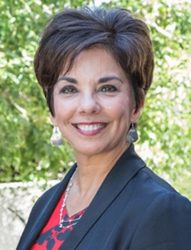
Lisa Urias launched Urias Communications in 2006 to provide strategic advertising, public-relations, and creative services to various Fortune 1000 clients, large nonprofit organizations, and government agencies throughout the U.S. and in Mexico. Prior to this, Lisa spent 12 years in international marketing with the Undersecretary of Energy of Mexico, Alberto Escofet of Alesco Consultores, providing marketing consulting to energy companies within Mexico. She also was the director of international marketing with SRP in Phoenix to market SRP’s technology to more than 70 countries annually.
Lisa received a bachelor’s degree from Arizona State University and completed the Stanford Latino Entrepreneur Institute program. She has received numerous awards: Arizona Business Magazine’s “Most Influential Women”; Arizona Business Magazine’s “Most Influential Minority Business Leaders”; Arizona Republic’s “13 to Watch in 2013”; and Phoenix Business Journal’s “Most Admired CEOs.”
1. Can you please describe your work and how public policy impacts how you manage your organization?
Public policy impacts all organizations because it shapes a community, state, and nation’s values and priorities. Are we investing in education to drive an educated workforce that can support our businesses and the Arizona economy? Do we invest in technology and high-speed internet that supports our growth and competitive advantage? Is the transportation, water and energy infrastructure sound so our longer-term business investment in Arizona makes sense?
Additionally, in Arizona, we don’t have as many large corporate headquarters, so we remain among the largest small-business states in the nation. That leaves many of us having to rely on government contracts to grow our businesses, since those tend to be the largest contracts available. As a certified Minority Business Enterprise (MBE), we encourage including MBEs in government contracting. Many corporations have their own internal goals, but some local and state government agencies have stopped instituting percentage goals for MBEs. We know that unconscious bias around MBE and women-owned businesses still exists. Those making selections often believe (without any sound justification) that MBEs or WBEs are not able to deliver on larger government contracts. That is clearly not the case. Ensuring we are considered and provided with equal opportunity is critical to the success of our businesses and others like ours.
2. How has the COVID-19 pandemic affected your work?
As a marketing and communications agency, COVID-19 has kept us busier than ever, pivoting to supporting our clients with their communications on how they’re responding to this crisis, including what they’re doing to keep their customers and employees safe. Our employees have been working from home since March, and we can manage. However, while it hasn’t been a performance problem, it is definitely less desirable. With teams like ours, synergy comes with working together, brainstorming ideas, spontaneous thoughts to share and continued in-person engagement with our clients. We’re making it work and have learned that we can do a lot of meetings online without having to run around everywhere, but we’re anxious to get back to the office and see one another. The agency’s culture suffers when you can’t be in the same place and connect in person. Plus, I’m just a little lonely! We need one another.
3. How has the Flinn-Brown Network been useful to you?
The Network has been a fantastic way to connect with leaders across the state to address issues you’d like to support or advance. It’s great to know you can email or pick up the phone at any time to discuss an opportunity or challenge with someone who has real impact in Arizona. I love the connectivity it has given us. I often get calls from Fellows, or sit on boards with them, where I can get an update on something they are working on so I can support their needs, or be aware of legislation that I need to support or oppose.
I was in the first cohort. Today, just as designed, we have many wonderful Fellows in elected office, sitting on state boards and commissions, and making a real impact. That alone is useful to me, to our cities, and to the state of Arizona.
4. Can you talk about your community engagement in the discussion of education equity?
As a board member of Greater Phoenix Leadership, Arizona Community Foundation, and the Arizona Hispanic Chamber of Commerce, I’m in many conversations about education. What we need to understand is that we have created policies, over time, that favor certain districts over others. The more affluent you are, the more options you have. When you can afford to live in the suburbs, generally speaking, school buildings are beautiful, teachers have better credentials and are paid better, there are more resources, and the quality of education is higher for students.
When you live in barrios and in rural areas, sometimes you don’t have up-to-date books, a math teacher, or even air conditioning. That doesn’t have to be the case. There’s no reason we shouldn’t have quality facilities, educational materials, and great teachers (with commensurate salaries) in our K-12 system to support our investment in education.
Education drives any state’s economic engine. While many like to talk about people fleeing California, that state’s economy is the largest in the U.S. and ranks as the world’s fifth largest economy, and much of that is driven by its University of California (UC) system. California has grown its own technology sector and driven incredible innovation. We can do the same!
Arizona leaders need to consider what we’re doing when we underfund our P-20 education system, and how it impacts communities that are underserved. It undermines everything we want: to ensure we’re giving every Arizonan the opportunity to reach their God-given potential and contribute to this state in meaningful ways. We have an opportunity to do better. And I know the Flinn-Brown Fellows can help drive a meaningful and equitable solution.